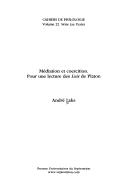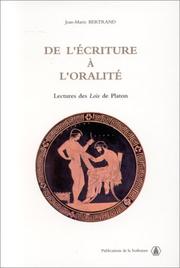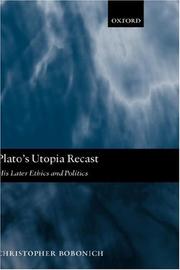| Listing 1 - 7 of 7 |
Sort by
|
Book
ISBN: 0226776972 9780226776972 Year: 1975 Publisher: Chicago (Ill.): University of Chicago press
Abstract | Keywords | Export | Availability | Bookmark
 Loading...
Loading...Choose an application
- Reference Manager
- EndNote
- RefWorks (Direct export to RefWorks)
Plato --- Plato. --- Plato - Laws
Book
ISBN: 9780190266172 0190266171 Year: 2015 Publisher: New York Oxford university press
Abstract | Keywords | Export | Availability | Bookmark
 Loading...
Loading...Choose an application
- Reference Manager
- EndNote
- RefWorks (Direct export to RefWorks)
What role did the performance of poetry, music, song, and dance play in the political life of the ancient city? How has philosophy positioned itself and articulated its own ambitions in relation to the poet tradition? The Polis and the Stage poses such questions through a reading of Plato last, longest, and unfinished work, the Laws. Plato's engagement with the Greek poetic tradition has long been recognized as foundational in the history of literary criticism, but the broader critical and philosophical significance of the Laws has been largely ignored. Although Plato is often thought hostile to mimetic art, famously banishing poets from the ideal city of the Republic, this book shows that in his final dialogue Plato made a striking about-face, proposing to rehabilitate Athenian performance culture and envisioning a city, in which poetry, music, song, and dance are instrumental in the cultivation of philosophical virtues. The psychological underpinnings of aesthetic experience and the power of mimetic art to predispose a society to specific kinds of constitutions are central themes throughout this study. Plato's views of the performative properties of language and genre receives systematic treatment in this study for the first time. Performance as a mechanism of sexual construction-a network of social practices uniquely suited to communicate and enforce normative conceptions of gender and erotic pleasure-is another focus, with special attention given to positions occupied by women in the culture envisaged in the Laws. As a whole, Marcus Folch's book provides an integrated interpretation of Plato's final dialogue with the Greek poetic tradition, an exploration of the dialectic between philosophy and mimetic art, which will be of interest to anyone concerned with understanding ancient Greek performance and the emergence of philosophical discourse in fourth-century Athens
Greek drama --- History and criticism. --- Plato. --- History and criticism --- Plato. - Laws --- Greek drama - History and criticism
Book
ISBN: 9516532969 9789516532960 Year: 1998 Volume: 112 Publisher: Helsinki : Societas scientiarum fennica = Finska vetenskaps-societeten,
Abstract | Keywords | Export | Availability | Bookmark
 Loading...
Loading...Choose an application
- Reference Manager
- EndNote
- RefWorks (Direct export to RefWorks)
Griekenland --- Emotions (Philosophy) --- Plato --- Emotions (Philosophy). --- Griekenland. --- Philosophy --- Plato. --- Plato - Philebus --- Plato - Laws --- Platon (428-348 av. j.c.) --- Lois --- Critique et interpretation --- Philebe

ISSN: 09904476 ISBN: 2859399399 2757422693 9782859399399 Year: 2019 Volume: 22 Publisher: Villeneuve d'Ascq : Presses universitaires du Septentrion,
Abstract | Keywords | Export | Availability | Bookmark
 Loading...
Loading...Choose an application
- Reference Manager
- EndNote
- RefWorks (Direct export to RefWorks)
Les Lois de Platon constituent une œuvre majeure dans l’histoire de la pensée politique. La perspective systématique, qui remonte vers les fondements de la législation, s’y combine avec l’élaboration concrète de lois détaillées, ce qui les distingue de la République. Leur importance vient en outre et avant tout de ce qu’elles ont élaboré une série de concepts et de principes politiques appelés à un long avenir. Négativement, les Lois, en un contraste frappant avec la thèse du philosophe-roi de la République, thématisent pour la première fois le principe en vertu duquel « le pouvoir absolu corrompt absolument » (principe dit de Lord Acton). Positivement, les notions de « constitution mixte », de « règne de la loi », et de « préambule législatif » y trouvent leur première articulation conceptuelle, voire leur première formulation. Dernier ouvrage de Platon, les Lois restent un texte peu fréquenté, en dépit de leur importance obvie. C’est que, outre leur longueur, elles sont d’écriture difficile et opaques dans leur structure. Le présent essai vise à fournir, d’abord de manière synthétique, puis en commentant un certain nombre de passages, les éléments clefs permettant de s’orienter dans le maquis de développements dont elles sont faites. Il propose ce faisant une interprétation originale de la relation complexe que les Lois entretiennent avec la République, en mettant au centre de l’analyse la question de la relation entre loi et persuasion.
Platonic philosophy --- Plato --- History and criticism. --- Criticism --- Political science --- Administration --- Civil government --- Commonwealth, The --- Government --- Political theory --- Political thought --- Politics --- Science, Political --- Social sciences --- State, The --- Plato. --- Political science - Greece. --- Plato. - Laws. --- philosophie --- médiation --- coercition --- lois

ISBN: 285944372X 9791035102203 9782859443726 Year: 1999 Volume: 54 Publisher: Paris Publications de la Sorbonne
Abstract | Keywords | Export | Availability | Bookmark
 Loading...
Loading...Choose an application
- Reference Manager
- EndNote
- RefWorks (Direct export to RefWorks)
Ce livre est bâti autour du dialogue des Lois de Platon, mais c'est aussi une synthèse sur la législation des cités grecques. À propos de la cité des Magnètes, on suit pas à pas ce qu'est la confection, la révision, la proclamation des lois, le travail du législateur qui vit dans un monde où l'oral et l'écrit ne suivent peut-être pas un développement aussi linéaire qu'on a bien voulu le dire. Chaque étape de cette recherche, construite de façon progressive, permet de constituer un dossier, non seulement de l'essentiel des documents épigraphiques et littéraires, mais aussi des débats les plus récents sur ces questions cruciales pour la compréhension du fonctionnement des systèmes politiques dans la Grèce antique. La constitution platonicienne est scrutée dans le détail, pas un des procédés de l'exercice du pouvoir, aussi retors soit-il, comme en témoigne l'usage de la rumeur, n'est laissé dans l'ombre. La théorie, disséquée, expliquée, éclairée est, sans cesse, mise en rapport avec les pratiques réelles des cités. Ce va-et-vient permet une ouverture sur l'ensemble du phénomène législatif dans le monde grec et l'élaboration de la pensée qui en accompagne les évolutions. Au carrefour des analyses des philosophes, des sémioticiens, des juristes et des historiens, ce livre propose une analyse nouvelle des modes de représentation des systèmes politiques grecs.
Plato. --- Droit grec --- Tradition orale --- Ecriture --- Idees politiques --- Histoire. --- Plato --- Classical Greek law --- Philosophy --- Écriture --- Idées politiques --- Écriture --- Philosophy. --- Platon. --- Platon --- Pensée politique et sociale. --- Grèce --- Politique et gouvernement --- Droit grec - Histoire. --- Tradition orale - Grece - Histoire. --- Ecriture - Grece - Histoire. --- Idees politiques - Grece - Histoire. --- Plato - Laws --- History --- Law --- cité grecque --- système politique --- législation --- législateur --- loi --- discours --- publication --- livre --- Grèce antique
Book
ISBN: 3805903464 9783805903462 Year: 1976 Volume: 17 Publisher: Berlin Schweitzer
Abstract | Keywords | Export | Availability | Bookmark
 Loading...
Loading...Choose an application
- Reference Manager
- EndNote
- RefWorks (Direct export to RefWorks)
Agricultural laws and legislation (Greek law) --- Law, Greek --- Plato --- 34 <09> --- Rechtsgeschiedenis --(algemeen) --- Aflāṭūn --- Aplaton --- Bolatu --- Platon, --- Platonas --- Platone --- Po-la-tʻu --- Pʻŭllatʻo --- Pʻŭllatʻon --- Pʻuratʻon --- Πλάτων --- אפלטון --- פלאטא --- פלאטאן --- פלאטו --- أفلاطون --- 柏拉圖 --- 플라톤 --- Law, Greek. --- Landwirtschaft. --- Recht. --- Plato. --- Platon. --- Griechenland (Altertum) --- 34 <09> Rechtsgeschiedenis --(algemeen) --- Agricultural laws and legislation (Greek law). --- Griechenland (Altertum). --- Greek law --- Law, Ancient --- Plato - Laws

ISBN: 0199251436 0191597082 019927410X 9786611930479 1281930474 0191530735 9780199274109 9780199251438 Year: 2002 Publisher: Oxford Clarendon Press
Abstract | Keywords | Export | Availability | Bookmark
 Loading...
Loading...Choose an application
- Reference Manager
- EndNote
- RefWorks (Direct export to RefWorks)
Political philosophy. Social philosophy --- General ethics --- Plato --- Ethics, Ancient --- Political ethics --- Political science --- Morale ancienne --- Morale politique --- Science politique --- History --- Philosophy --- Histoire --- Philosophie --- Plato. --- Ethics --- Political and social views --- -Plato --- -Aflāṭūn --- Aplaton --- Bolatu --- Platon, --- Platonas --- Platone --- Po-la-tʻu --- Pʻŭllatʻo --- Pʻŭllatʻon --- Pʻuratʻon --- Πλάτων --- אפלטון --- פלאטא --- פלאטאן --- פלאטו --- أفلاطون --- 柏拉圖 --- 플라톤 --- Contributions in political science --- -Ethics --- Aflāṭūn --- Ethics. --- Political and social views. --- Platon --- Platoon --- History. --- Платон --- プラトン --- Contributions in political science. --- Ethics, Ancient. --- Ethik. --- Political science. --- Politische Philosophie. --- Plato, --- Laws (Plato). --- Phaedo (Plato). --- Republic (Plato). --- Plato - Ethics --- Plato - Political and social views --- Plato - Phaedo --- Plato - Republic --- Plato - Laws
| Listing 1 - 7 of 7 |
Sort by
|

 Search
Search Feedback
Feedback About UniCat
About UniCat  Help
Help News
News